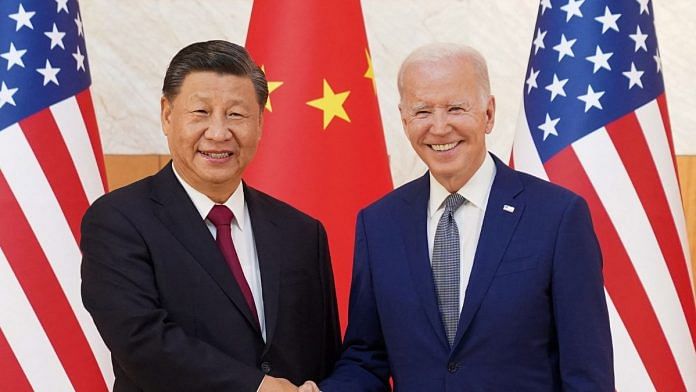This past fall, the U.S. government decided against a full renewal of the U.S.-China Science and Technology Agreement, instead favoring a short-term extension of the 44-year-old pact for a mere six months.
The agreement, originally forged as a symbol of cooperation between a dominant U.S. and an emerging China, has facilitated international collaboration in research and innovation for over four decades. Given the swift pace of China’s economic rise since the agreement was first signed in 1979, and with recent geopolitical tensions casting shadows over this relationship, a closer look is in order. From my perch as president and CEO of The New York Academy of Sciences, I strongly believe that it is in the interest of global science to advocate for the agreement’s full renewal.
Since its inception, the U.S.-China Science and Technology Agreement has laid the groundwork for an unparalleled exchange of knowledge, talent and resources between two nations that have become scientific powerhouses. By promoting scientific cooperation in areas such as energy, health, the environment and agriculture, the agreement has yielded groundbreaking discoveries that transcend borders and address shared global challenges.
Cooperation between the two countries helped China to transition away from ozone-depleting chlorofluorocarbons, thereby speeding up the closing of ozone holes in our atmosphere. The Science and Technology Agreement also enabled the sharing of influenza data used to devise yearly vaccines, which protect us all from new strains of flu.
Also read: Decoupling, derisking, China + 1. All Beijing wants is a less hostile, more predictable US
Regrettably, the recent escalation of tensions in U.S.-China relations threatened the advance of a wide range of scientific discoveries and understandings. Yes, there are clear and recurring issues around the security of intellectual property, the possible use of both data and heightened computational power to serve undesirable ends, and opacity in the exchange of information relating to the Covid-19 pandemic.
But the risk to science of abandoning the open collaboration among scientists from both countries outweighs even the most critical views. Critics may have good reason to be concerned about the transfer of sensitive technologies to China and the potential for dual-use technologies to be exploited for military purposes, but they neither appreciate the overall value of collaboration in science nor the extent to which China already has developed the scientific capacity to develop its own technologies with or without Americans’ direct participation.
Stringent oversight mechanisms, information-sharing agreements and transparency initiatives can help ensure that the collaborative process doesn’t compromise sensitive technologies. Both nations need to publicly commit to upholding ethical standards and respecting each other’s intellectual property rights, especially for emerging technologies like 5G and artificial intelligence. Indeed, it is in China’s interest to agree to these standards, given that they are world leaders in some technologies themselves.
Skeptics may see this as a naive wish, but history is filled with examples of when such bilateral scientific collaboration has taken place in the face of adversity. During the height of the Cold War, the U.S. and the Soviet Union embarked on the 1972 Apollo-Soyuz Test Project, the first international human spaceflight mission. It served as a symbol of detente and laid the groundwork for decades of further international collaboration in space exploration. A more recent example was seen during the Ebola outbreak in West Africa. Various nations, including the United States, China and Russia, joined forces to develop vaccines, treatments and containment strategies.
Collaboration enables scientists from different nations to pool their expertise and resources, thereby accelerating the pace of discovery. This benefits all of humanity and should be at the heart of our decision on renewing the Science and Technology Agreement.
Science and technology have always thrived on the exchange of ideas, cross-border collaboration and the free flow of information. More than 40 percent of the high-quality research papers that U.S.-based scientists produce involves cooperation with researchers abroad, and China and the U.S. are each other’s leading partner in producing scientific research.
Attempting to isolate nations from one another’s scientific pursuits will stifle progress, hinder innovation and hamper our collective ability to tackle global challenges. This is particularly the case with climate change, which does not recognize national borders.
Renewing the U.S.-China Science and Technology Agreement, especially during a time of heightened geopolitical tension, sends a powerful message: Despite political differences, the pursuit of scientific knowledge, understanding, and solutions transcends borders. The history of scientific progress is replete with examples of collaboration leading to remarkable breakthroughs. The Human Genome Project, the Large Hadron Collider and the International Space Station are all testaments to the power of global cooperation and how it pushes the boundaries of shared human understanding.
At the close of the next six months, the international community faces a crossroads. The decision to renew the Science and Technology Agreement should be driven by a recognition of the greater good that comes from collaboration. While there are legitimate concerns, the potential benefits to humanity far outweigh the risks as long as proper safeguards are in place. Renewing the agreement is not just a nod to the past decades of fruitful collaboration, but also a commitment to a future where science, innovation and progress continue to thrive. It’s a declaration that even in times of discord, the pursuit of knowledge and understanding remains a firm bridge between nations.
Nicholas B. Dirks is president and CEO of The New York Academy of Sciences. He is the author of the book “City of Intellect: The Uses and Abuses of the University.” Views are personal. This article was originally published on The Hill website.



